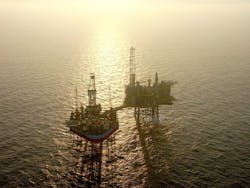Danish North Sea reservoir is suited to CO2 storage
Offshore staff
LYNGBY, Denmark – DNV GL has confirmed the feasibility of converting the Nini West reservoir in the Danish North Sea to serve as a CO2 store.
According to Maersk Drilling, following certification of feasibility to DNV GL’s Carbon Capture and Storage certification regime and the international standard, ‘Project Greensand’ has completed the first phase of validation.
The project seeks to develop capacity to deliver a large part of Denmark’s CO2 reduction target through re-purposing of discontinued offshore oil fields.
INEOS Oil & Gas Denmark, which operates the Nini field, also leads the Project Greensand consortium, in partnership with Wintershall Dea and Maersk Drilling.
DNV GL’s findings suggest Nini West could be suited to injection of 0.45 MM metric tons/yr (0.49 MM tons) of CO2 over a 10-year period, and that the subsea reservoir can safely contain the CO2 in compressed form.
In addition, the Geological Survey of Denmark and Greenland (GEUS), a research partner to the project, is conducting laboratory experiments on core material from the Nini West reservoir.
The goal is to have the first well ready for injection from the Nini platform in 2025, and over the longer term, to develop capacity to store around 3.5 MM metric tons/yr (3.86 Mm tons) of CO2 before 2030.
Maersk Drilling also expects the project to deliver understanding of how offshore drilling rigs and capabilities can be used to repurpose existing oil wells for CO2 injection and to handle well modifications during the injection period.
Under the next phase of validation, the company will apply DNV GL’s certification scopes for suitability of the CO2 injection well design and well construction process.
Wintershall Dea, which has been produced from the relevant oil fields in Denmark for several decades, expects the Greensand project to further its understanding of CCS.
11/25/2020
